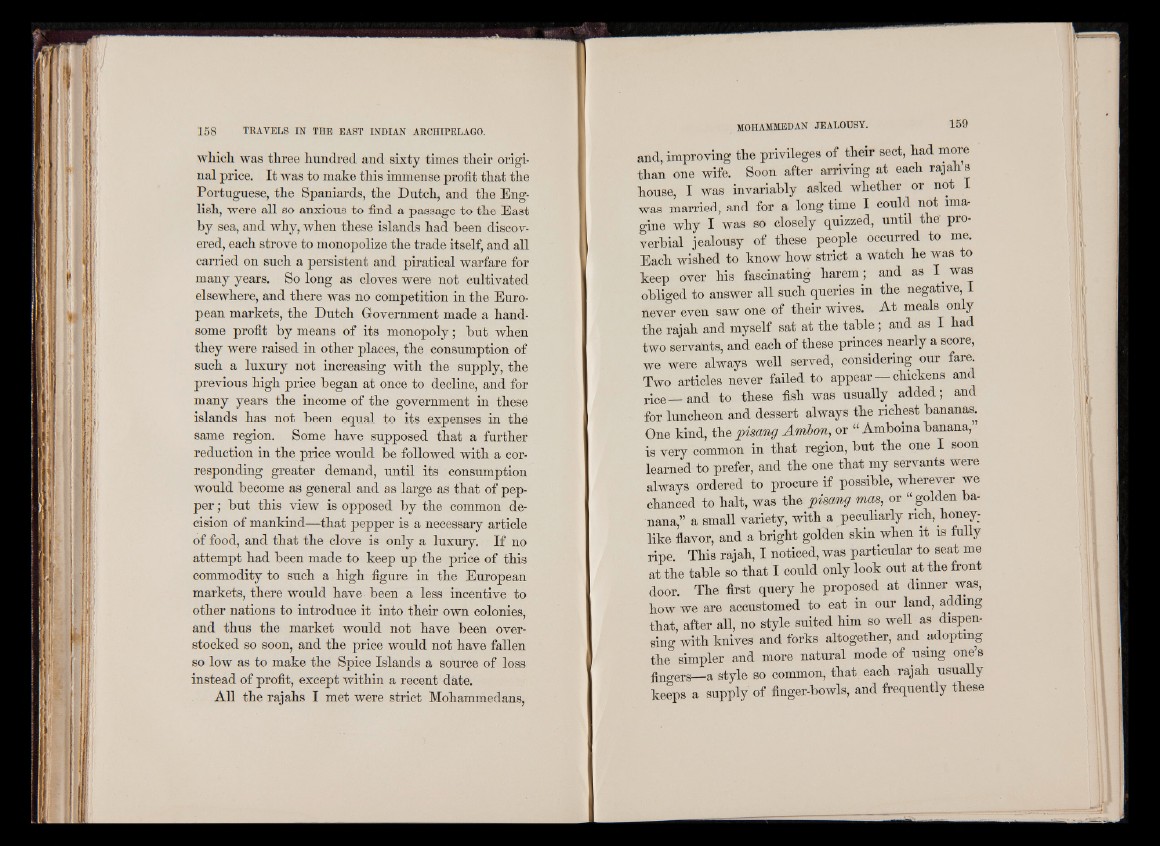
which was three hundred and sixty times their original
price. It was to make this immense profit that the
Portuguese, the Spaniards, the Dutch, and the English,
were all so anxious to find a passage to the East
by sea, and why, when these islands had been discovered,
each strove to monopolize the trade itself, and all
carried on such a persistent and piratical warfare for
many years. So long as cloves were not cultivated
elsewhere, and there was no competition in the European
markets, the Dutch Government made a handsome
profit by means of its monopoly; but when
they were raised in other places, the consumption of
such a luxury not increasing with the supply, the
previous high price began at once to decline, and for
many years the income of the government in these
islands has not been equal to its expenses in the
same region. Some have supposed that a further
reduction in the price would be followed with a corresponding
greater demand, until its consumption
would become as general and as large as that of pepper
; but this view is opposed by the common decision
of mankind—that pepper is a necessary article
of food, and that the clove is only a luxury. If no
attempt had been made to keep up the price of this
commodity to such a high figure in the European
markets, there would have been a less incentive to
other nations to introduce it into their own colonies,
and thus the market would not have been overstocked
so soon, and the price would not have fallen
so low as to make the Spice Islands a source of loss
instead of profit, except within a recent date.
All the rajahs I met were strict Mohammedans,
and, improving the privileges of their sect, had more
than one wife. Soon after arriving at each rajah’s
house, I was invariably asked whether or not
was married, and for a long time I could not imar
gine why I was so closely quizzed, until the proverbial
jealousy of these people occurred to me.
Each wished to know how strict a watch he was to
keep over his fascinating harem; and as I was
obliged to answer all such queries in the negative, I
never even saw one of their wives. At meals only
the rajah and myself sat at the table ; and as I had
two servants, and each of these princes nearly a score,
we were always well served, considering our fare.
Two articles never failed to appear — chickens and
rice— and to these fish was usually added; and
for luncheon and dessert always the richest bananas.
One kind, the pisang Ambon, or “ Amboina banana,
is very common in that region, but the one I soon
learned to prefer, and the one that my servants were
always ordered to procure if possible, wherever we
chanced to halt, was the piscmg mas, or “ golden banana,”
a small variety, with a peculiarly rich, honeylike
flavor, and a bright golden skin when it is fully
ripe. This rajah, I noticed, was particular to seat me
at the table so that I could only look out at the front
door. The first query he proposed at dinner was,
how we are accustomed to eat in our land, adding
that, after all, no style suited him so well as dispensing
with knives and forks altogether, and adopting
the simpler and more natural mode of using one’s
fingers—a style so common, that each rajah usually
keeps a supply of finger-bowls, and frequently these